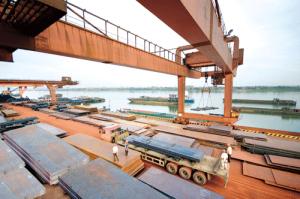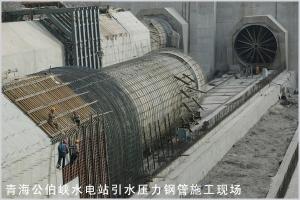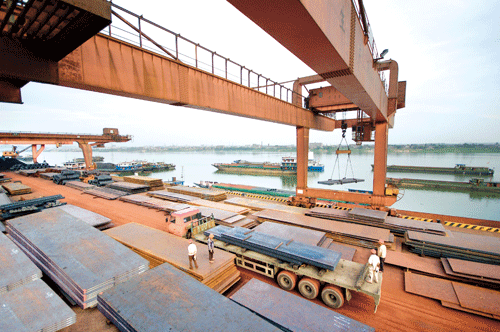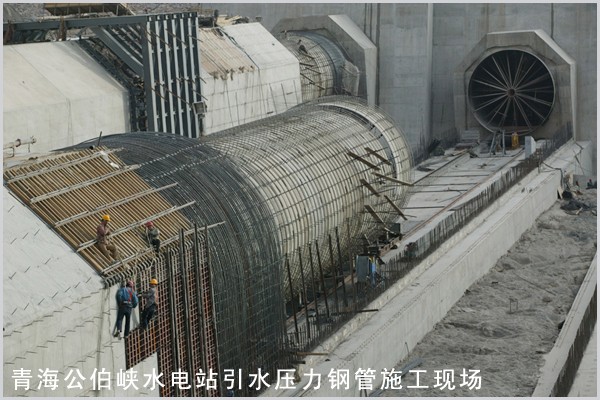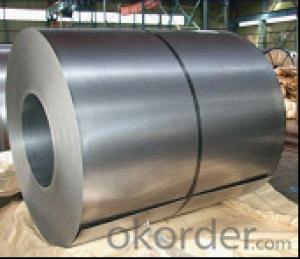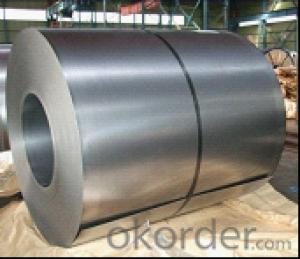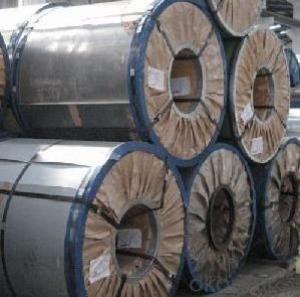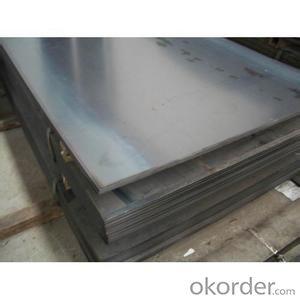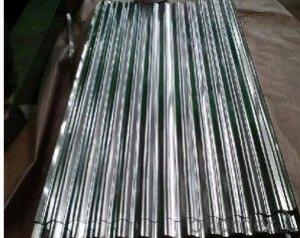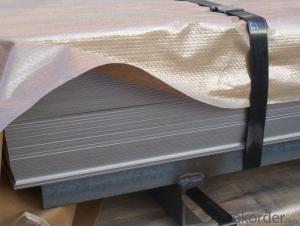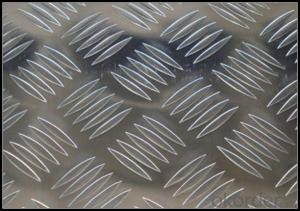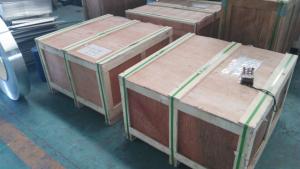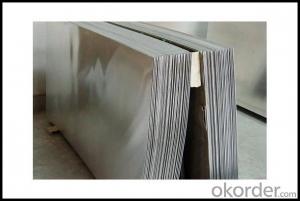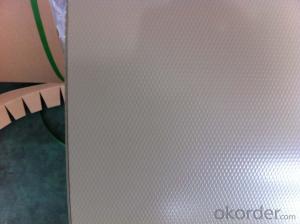Wuyang WQ960D plate steel production
- Loading Port:
- China Main Port
- Payment Terms:
- TT OR LC
- Min Order Qty:
- -
- Supply Capability:
- -
OKorder Service Pledge
OKorder Financial Service
You Might Also Like
High-strengthquenched and temperedsteel
WQ960type high strengthquenched and temperedsteel,makingthe pressure hullpieces,deeptidesaving, high-pressurestructural parts, aerospaceequipment, armored vehicles, manufactureof various types ofconstruction machinery,such as mininganddrilling rigused invarious types ofconstruction, power shovel,electric wheeldump trucks,mining vehicles, excavators,loaders,bulldozers,various types of cranes, coalhydraulic supportand othermachinery and equipment andwear-resistantstructural partsWQ960Dproduction process
Hot metal pretreatmenttop and bottom blowingconverter→→ LFfurnace→ RHvacuum treatment→→billetcontinuous castingbilletheatingtest →→high pressurewater descaling→→finishing→ ACCroughingwater-cooledcooling bed→straightening→cooling →finishing→Shottemperingtreatment →→→finished product storageperformance test.UsingLF,feedSi- Ca - Balines andRHvacuum treatment,to ensurecleanlinessof steel.
WuyangsteelS960QL,high-strength steelseries of varieties.
Wugangyield strength590Mpa ~ 960MPa,is widely used inthe manufacture100 tonsabovethe tubfloor,pumping machinery, excavators,truck crane, crawler cranes, coalhydraulic supportand so on.
Steel Type | thickness(mm) | Carbon content(%) |
S960Q、S960QL WQ960D、WQ960E | 10~30 | ≤0.56 |
31~60 | ≤0.61 | |
Mechanical Properties
specification (mm) | Re (Mpa) | Rm (Mpa) | A (%) | Shock temperature (℃) | AKV (J) | Cold-formed d=3a | ||
20 | 1010 | 1070 | 14.5 | -40℃ | 52 | 63 | 41 | good |
20 | 1000 | 1060 | 16 | -40℃ | 46 | 40 | 46 | good |
25 | 995 | 1050 | 16 | -40℃ | 76 | 53 | 61 | good |
25 | 1000 | 1050 | 15.5 | -40℃ | 66 | 55 | 63 | good |
25 | 1000 | 1060 | 15 | -40℃ | 66 | 74 | 46 | good |
50 | 975 | 1030 | 16 | -40℃ | 60 | 65 | 63 | good |
Quenchedtypewear-resistant steel:SS590Q Q550D WQ590 WH70Q S690Q S690QL WQ690D S690QL1 WDB620E WH785E WNM360A WNM360B WNM400A WNM400B
Wear plates:WNM360E.WNM400E.WNM450A.WNM500A.WRZ360.WRZ400A.
High-strengthquenched and temperedsteel:WQ690D.S960Q.WH100QD.WQ960E.S960Q.WQ890D.A514GrQ/A517GrQ/E
690/EQ70.A514GrF.
- Q: What are the standard dimensions for steel sheets?
- The specific type and grade of steel being used can cause variation in the standard dimensions for steel sheets. Generally, steel sheets are found in standard sizes of 4 feet by 8 feet or 4 feet by 10 feet. These dimensions are widely used in the construction industry and can be easily obtained from steel suppliers. Moreover, steel sheets can be tailored to specific dimensions to meet the requirements of a particular project. It is crucial to seek guidance from a steel supplier or manufacturer to ascertain the precise dimensions available for the desired type of steel sheet.
- Q: Can steel sheets be used for water tanks or reservoirs?
- Yes, steel sheets can be used for water tanks or reservoirs. Steel is a durable and corrosion-resistant material that can effectively store and contain water. Proper sealing and coating techniques are employed to prevent rusting and ensure the longevity of the tank or reservoir.
- Q: How do steel sheets perform in high-pressure environments?
- Steel sheets are highly resilient and perform exceptionally well in high-pressure environments. Due to their inherent strength and durability, steel sheets can withstand and effectively contain the immense pressure exerted on them. This makes them a preferred choice in applications such as pressure vessels, pipelines, and industrial machinery. The high-pressure environment puts significant stress on materials, but steel sheets have the ability to resist deformation and maintain their structural integrity under these conditions. Their exceptional tensile strength and ability to withstand compressive forces without buckling or breaking make them a reliable choice for withstanding high pressure. Furthermore, steel sheets are known for their excellent corrosion resistance. This is particularly important in high-pressure environments since it helps prevent any potential leaks or failures due to corrosion-induced weakening. Steel sheets can be further enhanced with coatings or treatments to provide additional protection against corrosion, making them even more suitable for such demanding applications. Steel sheets also offer a high degree of versatility and can be easily fabricated into various shapes and sizes to meet specific requirements. This adaptability allows for the customization of steel sheets to suit different high-pressure environments, ensuring an optimal performance in a range of industrial settings. In summary, steel sheets are highly reliable and perform exceptionally well in high-pressure environments. Their strength, durability, resistance to deformation, and corrosion resistance make them a preferred choice for applications where containment of high-pressure substances is essential.
- Q: What are the different methods of surface preparation for steel sheets?
- Some of the different methods of surface preparation for steel sheets include sandblasting, chemical cleaning, mechanical cleaning, and power tool cleaning.
- Q: Are steel sheets resistant to radiation or electromagnetic interference?
- No, steel sheets are not inherently resistant to radiation or electromagnetic interference.
- Q: Can steel sheets be formed into complex shapes?
- Various metalworking processes, including bending, rolling, stamping, and laser cutting, enable the formation of complex shapes using steel sheets. By manipulating and transforming the sheets, intricate and custom shapes can be achieved to fulfill specific design requirements. Steel's malleability and strength allow for the creation of complex shapes without compromising its structural integrity. These capabilities find extensive application in industries like automotive, aerospace, construction, and manufacturing, where the demand for precise and intricate components is high.
- Q: Can steel sheets be used for kitchen appliances?
- Yes, steel sheets can be used for kitchen appliances. Steel is a durable and versatile material that is commonly used in the manufacturing of various kitchen appliances such as refrigerators, ovens, and dishwashers. It offers excellent heat resistance, is easy to clean, and provides a sleek and modern look to the appliances.
- Q: How thick is steel filing cabinet usually made of steel plates?
- A lot of people will hold 0.6 of the said 0.8 material, this is because the cold rolled plate after forming electrostatic spraying powder and environmental protection, so it is actually only 0.6mm 0.8mm bare steel, on this point, if you are purchasing large quantities of words, can use vernier caliper to card
- Q: How much is one meter for laser cutting steel plates?
- The length and width are smaller than 300MM and the thickness is less than 12MM, because of good nesting material, we provide. By weight, the carbon steel is 8~9 yuan per kilogram and the quantity is large, 7~8 yuan per kilogram.
- Q: Are the steel sheets resistant to scratching or abrasion?
- Steel sheets exhibit a remarkable resistance to scratching and abrasion. Renowned for its exceptional durability and strength, steel effectively wards off numerous forms of damage, such as scratches and abrasions. Its sleek and solid surface reduces susceptibility to scratches from sharp objects or rough surfaces. Moreover, the robust molecular structure of steel hampers easy wear and tear, guaranteeing its longevity in high-traffic or demanding settings. All in all, steel sheets prove to be an outstanding option for safeguarding against scratching or abrasion.
Send your message to us
Wuyang WQ960D plate steel production
- Loading Port:
- China Main Port
- Payment Terms:
- TT OR LC
- Min Order Qty:
- -
- Supply Capability:
- -
OKorder Service Pledge
OKorder Financial Service
Similar products
Hot products
Hot Searches
Related keywords
